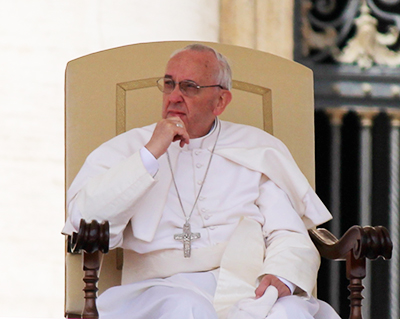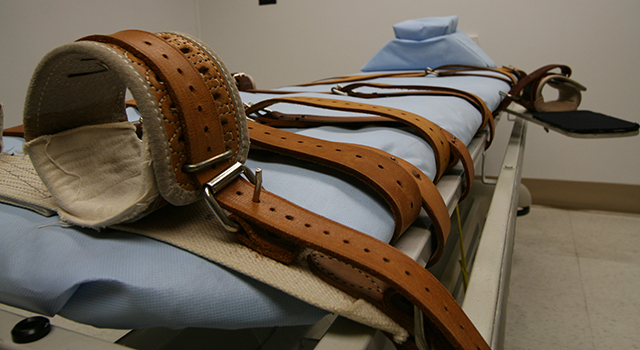By Catholic News Agency - Catholic News Agency
VATICAN CITY | The Vatican has changed the Catechism of the Catholic Church's teaching on the permissibility of the death penalty, which the Church has taught is legitimate in limited cases, stating the penalty is ‘inadmissible,’ and its elimination should be sought.

Pope Francis is pictured here in a file photo at one of his general audiences. (CNA photo)
A new draft of paragraph 2267 of the Catechism of the Catholic Church was issued by the Congregation for the Doctrine of the Faith Aug. 2, after Pope Francis approved it in May.
Quoting Pope Francis’ words in a speech of Oct. 11, 2017, the new paragraph states, in part, that “the Church teaches, in the light of the Gospel, that ‘the death penalty is inadmissible because it is an attack on the inviolability and dignity of the person,’ and she works with determination for its abolition worldwide.”
Reasons for changing the teaching, the paragraph says, include: the increasing effectiveness of detention systems, growing understanding of the unchanging dignity of the person, and leaving open the possibility of conversion.
Until now, the Church has consistently taught that the state has the authority to use the death penalty, in cases of “absolute necessity,” though with the qualification that the Church considered such situations to be extremely rare.
The Catechism of the Catholic Church had stated: “Assuming that the guilty party’s identity and responsibility have been fully determined, the traditional teaching of the Church does not exclude recourse to the death penalty, if this is the only possible way of effectively defending human lives against the unjust aggressor.”
The new teaching will be included in all the editions of the Catechism going forward, the Aug. 2 communique stated.
The full text of the new draft of paragraph 2267 states, in full:
“Recourse to the death penalty on the part of legitimate authority, following a fair trial, was long considered an appropriate response to the gravity of certain crimes and an acceptable, albeit extreme, means of safeguarding the common good.
“Today, however, there is an increasing awareness that the dignity of the person is not lost even after the commission of very serious crimes. In addition, a new understanding has emerged of the significance of penal sanctions imposed by the state. Lastly, more effective systems of detention have been developed, which ensure the due protection of citizens but, at the same time, do not definitively deprive the guilty of the possibility of redemption.
“Consequently, the Church teaches, in the light of the Gospel, that ‘the death penalty is inadmissible because it is an attack on the inviolability and dignity of the person,’ and she works with determination for its abolition worldwide.”
In a letter to bishops Aug. 2, Cardinal Luis Ladaria, prefect of the Congregation for the Doctrine of the Faith, gave a brief overview of developments to the Church's teaching on the death penalty over the last decades, and the perspective of the three most recent popes.
He noted, in particular, Pope St. John Paul II's teachings in Evangelium Vitae, which were subsequently added to the Catechism of the Catholic Church, presenting the death penalty as not a proportionate penalty for the gravity of certain crimes, though justifiable if “the only practicable way to defend the lives of human beings effectively...”
“The new revision... situates itself in continuity with the preceding Magisterium while bringing forth a coherent development of Catholic doctrine,” Ladaria wrote.
“The new formulation of number 2267 of the Catechism of the Catholic Church desires to give energy to a movement towards a decisive commitment to favor a mentality that recognizes the dignity of every human life,” he said. “And, in respectful dialogue with civil authorities, to encourage the creation of conditions that allow for the elimination of the death penalty where it is still in effect.”


Comments from readers